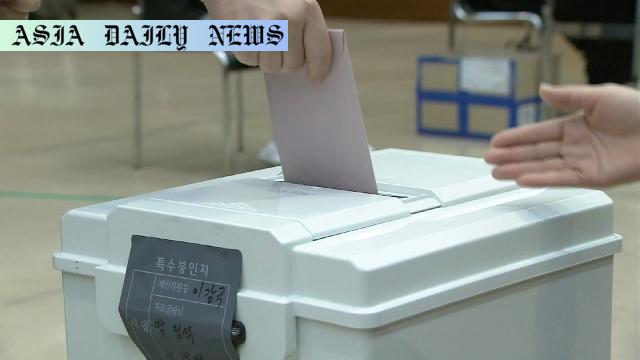Overseas Voting: Advance voting begins in South Korea’s presidential elections, allowing 258,000 citizens abroad to participate.
- Overseas voting for South Korea’s presidential election opened on Tuesday.
- Voting is available to 258,000 eligible nationals, including 38,600 in Japan.
- The election features Democratic candidate Lee Jae-myung and conservative Kim Moon-soo.

Introduction: The Significance of Overseas Voting in South Korea
Overseas voting for South Korea’s presidential election commenced on Tuesday, marking a significant chapter in the nation’s democratic process. Scheduled ahead of the domestic polls set for June 3, this initiative allows South Korean nationals residing abroad to participate in shaping the country’s future leadership. The central election commission reports that a total of 258,000 eligible voters, aged 18 or older, have registered to vote from overseas. This level of engagement demonstrates the responsible civic participation of voters who are keen to contribute to the democratic process, even beyond their home shores.
A Look at Participation Worldwide
Among the registered voters, approximately 38,600 reside in Japan. To accommodate these participants, polling stations have been set up at 19 locations across the country. Such efforts by the election commission underline the inclusivity of South Korea’s democratic framework, ensuring that geographical boundaries do not hinder its citizens’ ability to vote.
Addressing Political Dynamics
The election itself has garnered significant attention globally due to its political implications. Following the impeachment of former President Yoon Suk-yeol, the nation faces a critical leadership decision. The two primary candidates are Lee Jae-myung, representing the Democratic Party, and Kim Moon-soo from the ruling conservative People Power Party. Recent polls suggest a significant lead for Lee Jae-myung, with 51% support compared to 29% for Kim Moon-soo. Voter interest and turnout, both domestically and internationally, are expected to play a pivotal role in determining the outcome.
Civic Voices from Abroad
The process has also brought forward diverse voices from South Koreans living globally. In Japan, South Korean Ambassador Park Cheol-hee led by example, casting his vote at a Tokyo polling station. A voter, a 34-year-old corporate employee residing in Japan for over a decade, expressed hope for improved relations between South Korea and Japan under the new president. This sentiment echoes the aspirations of many overseas nationals, emphasizing the importance of progressive international relationships.
Building International Civic Responsibility
The broader implications of overseas voting go beyond just numbers. It represents the South Korean government’s commitment to upholding democratic rights, irrespective of geographic constraints. By engaging its expatriate community in political processes, South Korea sets a precedent for other nations aiming to promote inclusive democracy on a global scale.
Conclusion: A Democratic Milestone
The commencement of overseas voting for South Korea’s presidential election is more than just a logistic achievement; it is a testament to the resilience of democratic processes. Involving citizens abroad ensures a truly representative government, while fostering an active political engagement among expatriates. As the country braces for an important leadership decision, the voices of these overseas voters further strengthen the democratic foundation of South Korea, symbolizing hope and progress for its global community.



Commentary
The Significance of Overseas Voting in Modern Democracies
The commencement of overseas voting in South Korea’s presidential election deserves recognition as a testament to the evolving global landscape of democracy. In today’s interconnected world, millions of citizens reside outside their home countries, yet remain deeply connected to their roots. By allowing them to participate in key national events like elections, governments not only honor their contributions but also ensure policies are shaped by a broader array of voices, diverse experiences, and global perspectives.
Empowering Expatriates and Strengthening Citizenship
South Korea’s initiative to facilitate overseas voting empowers expatriates, encouraging them to remain actively involved in their homeland’s political affairs. This inclusivity reinforces their sense of belonging and strengthens their identity as citizens. For South Koreans abroad, voting is not just a civic duty; it is an act of solidarity, a way to influence decisions that will undoubtedly impact their families, friends, and the nation they represent globally.
The Intersection of Politics and Diplomacy
What makes this election especially significant is its timing, coming after the impeachment of a former president, and the heightened need for fostering international relations. The sentiment expressed by South Koreans living in Japan, who hope for progressive leadership that respects and nurtures bilateral ties, speaks volumes. It highlights how domestic elections often carry international implications, intertwining politics and diplomacy more than ever before.
A Step Toward Inclusive Democracy
In the grand scheme of global politics, South Korea’s overseas voting initiative illustrates what inclusive democracy looks like in action. By ensuring that every voice counts, regardless of geography, the nation sets an example worth emulating by others. This milestone underscores the idea that democracy thrives when engagement transcends borders, uniting citizens worldwide in collective decision-making.